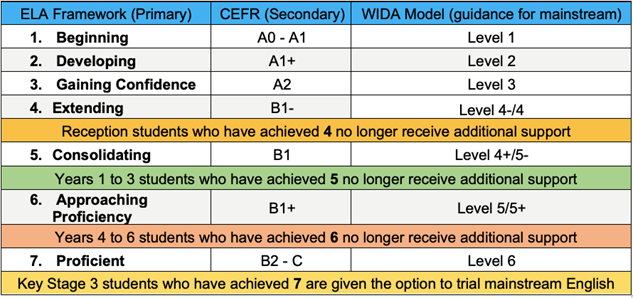Learning English at The British School, Guangzhou
For many students, the British School of Guangzhou is where their English language learning journey truly begins. As a school that prides itself on inclusivity, all students are placed within mainstream classes from the outset. This is because we believe that all students, regardless of their level of English, can learn and thrive within the mainstream English language curriculum of our international school. Class teachers in Primary and subject specialists in Secondary are trained to support the language and learning needs of all children: At BSG, all teachers, in addition to their specialisms, are English as an Additional Language teachers.
Working alongside the mainstream class teachers in Primary and subject specialists in Secondary, are a team of highly qualified EAL teachers who work closely with those students who are focused on developing their English language skills. There is a clear structure for language learning progression and cross-curricular language support across both phases; although the provision and methods of support differs slightly in Primary and Secondary. The EAL programmes provide continued support to students from Reception to the end of KS4 (Y11)
EAL in Primary Phase
All Primary EAL teachers are members of a year team and work closely with the mainstream teachers of that year group. Language planning is done using the content of the class curriculum in order to integrate content and language learning needs. The students can then access, fully participate and contribute to class discussion from a very early stage, thus simultaneously promoting the understanding of content with the development of language. At BSG, language learning needs are not a barrier to the learning of content.
Reception to Year 3
With our youngest students, we recognise the huge importance of maintaining the development of the mother tongue while developing English alongside it. EAL support is tailored to the needs and interests of individual students. EAL teachers work with the students in small groups 4 times a week and offer 1:1 support once a week. Timetables are planned with the classroom teachers so that the students do not miss crucial learning within the classroom. Students are assessed using the EAL levels and on reaching level 4 in Reception and level 5 in Years 1 and 2 no longer receive EAL provision. (See table below)
Year 4 to Year 6
In KS2, students who need continued English language learning provision are offered EAL support in place of their Mandarin lessons. This is because by the age , students have a firmer grasp of their first language and as the curriculum demand increases, it becomes more difficult to take students out of the mainstream lessons. During this time, EAL teachers work closely with the students in small groups 4 times a week and offer 1:1 support once a week. They can still continue with Mandarin as it is offered as an optional ASA (After School Activity) instead. Students are assessed using the EAL levels and on reaching level 5 in years 3&4 and working in level 6 in years 5 & 6 no longer receive EAL provision. (See table below)
EAL in Secondary Phase
Students embarking on the EAL pathway will develop a solid foundation by consolidating prior learning in KS2. From this basis, they will be empowered to engage with more advanced materials and will be guided by their teachers to ensure ongoing progress in their language development. EAL specialists will help learners navigate the language challenges of all subjects and will give continued support to ensure EAL students can participate actively and confidently across all subjects.
Students will develop a range of communication skills in reading, writing, listening and speaking while focusing on engaging topics such as: conservation/environment, culture/history, science/technology, music/art and human achievement. Topics are cross curricular and build confidence in all subjects areas.
Students will make significant progress from year 7, 8 to 9 and will advance from A2/B1 to B2 on the CEFR framework. This means, they will have developed the language level necessary to engage fully with all IGCSE subjects by Y10.
Those students who wish to advance their language further in preparation for A-level and IELTS opt to follow the IGCSE ESL pathway for a structured approach to their continued language envelopment.
EAL Ladder and levels required to fully access the curriculum through English at BSG

English as our Common Language
Whilst we recognise the crucial role of the first language on learning and on learning subsequent languages, we strongly encourage our student who can speak English to use it at school as this is our common language in the school. There are a number of reasons for this.
- It provides our students with the opportunities they need to practice using English
- It ensures that no child feels left out and we can have a more international mix of friendships
- Teachers can understand the kind of language the children are using with each other and prevent inappropriate language being used and protect children from saying hurtful things to each other.
We do not ban any languages and in fact encourage the use of the home language when we feel that this will enhance learning.
The promotion of our Common Language also takes a graduated approach; the younger children are encouraged to use it whilst for the students from KS2 and above, it is an expectation that they do so. The exception is when we have new students who are also new to English. This is managed by using first language buddies.
*EAL = English as an Additional Language
*ESL = English as a Second Language
*Phases = Primary phase and Secondary phase



